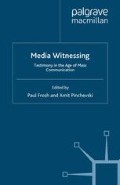Abstract
The issues of trauma and cultural memory or the effects of violence and victimization on the formation of identity are no doubt of great relevance to our present times. This has not escaped the notice of the academia, and trauma theory, which has been in circulation for many years, is at the forefront of academic research in a large range of fields — from psychology and cognitive science to literature and screen studies. In this chapter, I will relate the rise of trauma theory to a ‘crisis in representation’ evidenced in both the humanities and the social sciences.1 Trauma is not restricted to the outcome of devastating events. As Thomas Elsaesser notes, the significance of the term is due less to its reference to catastrophic events than to the revised understanding of referentiality that it fosters. Thus, according to Elsaesser, ‘Trauma theory is not so much a theory of recovered memory as it is one of recovered referentiality’ (2001, p. 201).
Access this chapter
Tax calculation will be finalised at checkout
Purchases are for personal use only
Preview
Unable to display preview. Download preview PDF.
References
T. W. Adorno (1993) ‘Theory of Pseudo-Culture’, Telos, vol. 95, 33.
J. C. Alexander (2004) ‘Towards a Theory of Cultural Trauma’, in J. C. Alexander (ed.), Cultural Trauma and Collective Identity, 1–30 (Berkley, California: University of California Press).
N. C. Auerhahn and D. Laub (1984) ‘Annihilation and Restoration: Post-Traumatic Memory as Pathway and Obstacle to Recovery’, International Review of Psycho-Analysis, vol. 11, 327–44.
W. Benjamin (1999/1) ‘On the Program of the Coming Philosophy’ (1918), Selected Writings, vol. I, ed. M. W. Jennings, H. Eiland, and G. Smith, trans. Rodney Livingstone and others (Cambridge, MA: Harvard University Press).
W. Benjamin (1999/2)‘Experience and Poverty’ (1933), Selected Writings, vol. 2.
W. Benjamin (1999/3)‘The Storyteller’, Selected Writings, vol. 3.
H. Bergson (1926) Creative Evolution, trans. Arthur Mitchell (New York: Henri Holt).
R. Brand (2002) ‘Experiment in the Technique of Awakening: Working through Walter Benjamin’s Arcade Project’, Graduate Faculty Philosophical Journal, vol. 23, no. 2, 213–26.
F. Breithaupt (2005) ‘The Invention of Trauma in German Romanticism’, Critical Inquiry, vol. 32 (autumn), 77–101.
C. Caruth (1996) Unclaimed Experience: Trauma, Narrative and History (Baltimore, MD: Johns Hopkins University Press).
C. Caruth (1992) Trauma: Explorations in Memory (Baltimore, MD: Johns Hopkins University Press).
S. Cavell (1994) In Quest of the Ordinary: Lines of Skepticism and Romanticism (Chicago: University of Chicago Press).
G. Deleuze (1989) Cinema 2: The Time-Image, trans. Hugh Tomlinson and Robert Galeta (Minneapolis: University of Minnesota Press).
M. A. Doane (2002) The Emergence of Cinematic Time (Cambridge, MA: Harvard University Press).
T. Elsaesser (2001) ‘Postmodernism as Mourning Work’, in ‘Special Debate: Trauma and Screen Studies’, Screen, vol. 42, no. 2, 193–201.
S. Felman and D. Laub (1992) Testimony: Crises of Witnessing in Literature, Psychoanalysis and History (New York and London: Routledge).
S. Freud (1961) Beyond the Pleasure Principle, ed. and trans. J. Strachey (New York: W.W. Norton).
J. Habermas (1979) Communication and the Evolution of Society (Boston: Beacon Press).
J. Habermas (1989) The Structural Transformation of the Public Sphere: An Inquiry into a Category of Bourgeois Society (Oxford: Polity Press).
M. Hansen (2004) ‘The Time of Affect, or Bearing Witness to Life’, Critical Inquiry, vol. 30, no. 3, 584–626.
M. Heidegger (1972) Sein und Zeit (Tubingen: Max Niemeyer).
M. Heidegger (1998) ‘What is Metaphysics?’, in W. McNeill (ed.), Pathmarks (Cambridge UK and New York: Cambridge University Press).
I. Kant (1987) The Critique of Judgment, trans. W.S. Pluhar (Indianapolis: Hackett Publishing).
D. LaCapra (1999) ‘Trauma, Absence, Loss’, Critical Inquiry, vol. 25, no. 4, 696–727.
G. O’Brien (2003) ‘Stop Shooting’, Artforum, vol. 42, no. 2, 39.
J. D. Peters (2001) ‘Witnessing’, Media, Culture and Society, vol. 23, no. 6, 707–23. Also in this volume, Chapter 1.
S. Radstone (2000) Screening Trauma: Forest Gump, Film and Memory (New York and Oxford: Berg).
A. Taubin (2003) ‘Part of the Problem’, Film Comment, vol. 39, no. 5, 26–33.
L. Wittgenstein (1922) Tractatus Logico-Philosophicus, trans. C. K. Ogden (London and New York: Routledge; publication date: 1999).
L. Wittgenstein (1958) Philosophical Investigations (London: Macmillan).
D. Young (2005) ‘Dis/affected: The Sense(s) of Violence in Dennis Cooper and Gus Van Sant’, Continuum: Journal of Media and Cultural Studies, vol. 19, no. 4, 495–505.
Editor information
Editors and Affiliations
Copyright information
© 2009 Roy Brand
About this chapter
Cite this chapter
Brand, R. (2009). Witnessing Trauma on Film. In: Frosh, P., Pinchevski, A. (eds) Media Witnessing. Palgrave Macmillan, London. https://doi.org/10.1057/9780230235762_10
Download citation
DOI: https://doi.org/10.1057/9780230235762_10
Publisher Name: Palgrave Macmillan, London
Print ISBN: 978-1-349-36236-3
Online ISBN: 978-0-230-23576-2
eBook Packages: Palgrave Social & Cultural Studies CollectionSocial Sciences (R0)

